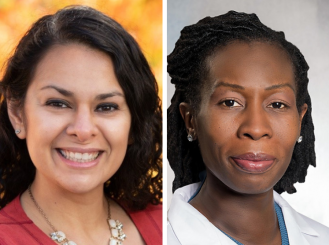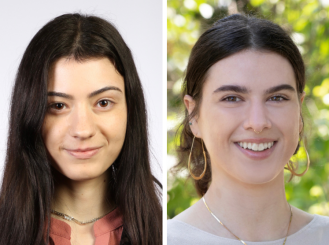By Narjust Florez, MD, Fatima Wilder, MD, MSc, Lauren Kiel, BS, and Rebekah Kaufman, MS
It is about time that we change the narrative of lung cancer being a disease that impacts elderly men with a smoking history into one that encompasses our modern reality of an inclusive patient population, including women and especially including young patients. Indeed, in recent years, an increasing incidence of lung cancer among patients younger than age 50 has been reported in Europe, Asia, and the United States.1 Young patients with lung cancer are more likely to be women of Asian or Hispanic descent, have adenocarcinoma histology, and are more likely to present with distant metastases at diagnosis.2 Notably, there is also greater representation of Black individuals among young patients presenting with lung cancer compared to older patients, and Black race has been identified as a poor prognostic factor amongst young people.3,4 It is therefore increasingly importance that we pay ample attention to young adults with lung cancer, including Black individuals, particularly in light of how current lung cancer screening guidelines only recommend to evaluate older patients (age 50 to 80) with a 20 pack-year smoking history who ceased smoking up to 15 years ago.
Young patients are more likely to be diagnosed at a time in their lives when a cancer diagnosis is not age normative and is profoundly disruptive. As such, compared to older patients with lung cancer, younger patients have more unmet needs, including in the psychosocial and physical domains. For instance, general young adult cancer literature supports how feelings of isolation, especially from peers, and heightened emotional distress is common; lung cancer-specific literature depicts how emotional distress is particularly pertinent among this patient population.5,6 In what is an underdiscussed topic, the National Cancer Institute also reports how younger age at diagnosis increases the risk of financial toxicity. This may be due to a lack of savings and assets, additional financial responsibilities such as raising children, having high out-of-pocket costs, and not yet having health insurance, as those younger than 65 are not eligible for Medicare and an increasing number of employers are not providing subsided health care insurance, all of which contribute to younger patients with cancer being at higher risk of bankruptcy than their older counterparts.7
Sexual health, another underdiscussed topic, is of further concern. The 2021 Sexual Health Assessment in Women With Lung Cancer (SHAWL) Study, the largest study to date evaluating sexual dysfunction in patients with lung cancer, not only found that 75% of women suffered from moderate to severe sexual dysfunction, but also that young patients were three times more likely to experience sexual dysfunction and report relationship issues with their partners than were the study’s older patients.8,9 Though effects of lung cancer treatments on young women’s fertility remain largely unexplored, available data is unsurprisingly dire, as alkylating agents commonly used in lung cancer treatment have been associated with the highest risk of ovarian failure among cytotoxic chemotherapeutic medications. Studies regarding immune checkpoint inhibitors have further yielded unfavorable results including risk for hypogonadism, hypophysitis, hypothyroidism, low birth weight, increased miscarriage rates, stillbirth, and premature delivery.10,11 Early-generation TKIs have also been shown to negatively affect total follicle count, oocyte recovery, and ovarian reserve, reduce an embryo’s overall developmental potential, and even produce teratogenic effects.12 Furthermore, only 66 cases of lung cancer during pregnancy have been confirmed pathologically; 70% of those patients had an overall survival of only a few months.13 As only around 10% of patients age 15 to 19 and 1% to 2% of patients age 20 to 39 are enrolled in U.S. clinical trials,14 as well as how our current health care system is not yet suited to treat young patients with cancer due to a lack of comprehensive understanding on how lifestyle and genomic factors contribute to the global rise of cancer incidence among this patient population, there remains an undoubtedly pressing need to comprehensively understand and address the unmet needs of young patients, including those with lung cancer.15
Such is the mission of the Florez Laboratory at Dana-Farber Cancer Institute and collaborators such as Dr. Fatima Wilder from Brigham’s and Women Hospital. In April 2023, our team commenced the novel Young Lung Cancer: Psychosocial Needs Assessment Study to assess the prevalence of psychosocial distress (anxiety and depression) among a purposefully diverse sample of young patients with lung cancer. Though the investigation is currently in its latter stages of recruitment, we aim to explore the mental health consequences of a lung cancer diagnosis at a young age, patient experiences with the health care system, and the financial impact of a lung cancer diagnosis. Further, we will soon launch the first international registry regarding pregnancy and lung cancer, in which clinicians from around the globe will be able to document short- and long-term outcomes for the mother with lung cancer and her child, in order to best understand maternal and fetal outcomes, therapies utilized, and new lung cancer characteristics present in this patient population. Thanks to the support from a Career Development Award from Conquer Cancer, the ASCO Foundation, too, we will also employ a large-scale evaluation of the impact of immune checkpoint inhibitors on premenopausal women’s ovarian reserve, as well as their sexual health and fertility-related concerns, perspectives, and experiences, gaining insight into how these needs evolve before, during, and after lung cancer treatment.
Through such efforts, the Florez Laboratory and collaborators are poised to be a leader studying the unique needs of the growing population of young patients with lung cancer and are committed to using our gained knowledge to advocate for actionable strategies and future directions towards tailoring clinical discussions, treatment plans, support, and resources to a more inclusive and contemporary patient population that is young patients with lung cancer.
Until such preliminary results have been disseminated, though, here are some of our top suggestions that oncologists should be aware of when treating young patients with lung cancer:
- Multidisciplinary care is essential! While most young patients with lung cancer will be diagnosed with advanced-stage disease, many can benefit from the aggressive treatment of oligometastatic disease that, after response to systemic therapy, can provide local disease control.
- Fertility preservation conversations should begin during the first visit, including discussions surrounding its financial and logistical challenges.
- Biomarker testing is critical, as many young patients will have a target mutation.
- Early incorporation of financial advisors/navigators and social work is recommended.
- Communication preferences should be discussed, including patients’ preferred way to receive education and results from their care team (e.g., patient portal messages, phone calls, and/or emails).
- Sexual health and mental health needs should be considered part of routine oncology care.
- Consider referral to patient support groups or lung cancer foundations that provide additional patient support and community.
- Create clear expectations about the role of family members in patient care, including parents, partners, and children.
- Certain groups such as Black individuals and other underrepresented populations have a historical mistrust of the health care system due to significant occurrences that have targeted their racial group. As such, it may take more effort and understanding from health care teams to support these patients, earn their trust, and care for them.
- As always, attention should be paid to social determinants of health and how they impact patient care. Considerations may include:
- Level of education and patient ability to understand their medical condition.
- If patients have young children, feasibility of taking time off work or securing childcare to facilitate attending appointments.
- Insurance status, as young patients may be uninsured or underinsured.
- Young patients may have less flexibility with getting treatment with regards to their employer, and therefore have less flexibility in missing work for doctor’s appointments.
Dr. Florez is a thoracic medical oncologist, associate director of The Cancer Care Equity Program at Dana-Farber Cancer Institute, and an assistant professor of medicine at Harvard Medical School. Her clinical interests include targeted therapy for lung cancer and the care of women and young patients with lung cancer, including their unique aspects of cancer survivorship. Aside from her clinical interests, Dr. Florez is also a globally acclaimed and highly productive researcher in cancer health disparities and gender and racial. Disclosure.
Dr. Wilder is a board-certified surgeon and an associate surgeon at Brigham and Women's Hospital. Her clinical interests include lung cancer, esophageal cancer, chest wall and mediastinal diseases, and airway tumors. Additionally, Dr. Wilder serves on the Society of Thoracic Surgeons Committee for Diversity, Equity, and Inclusion, and is a prominent researcher in cancer health disparities. Disclosure.
Ms. Kiel is a senior research assistant at the Florez Laboratory at Dana-Farber Cancer Institute. She has ample experience in designing, leading, and analyzing investigations pertaining to young patients with lung cancer, including the current Young Lung Cancer: Psychosocial Needs Assessment, based out of Dana-Farber Cancer Institute. Disclosure.
Ms. Kaufman is a research assistant at the Florez Laboratory at Dana-Farber Cancer Institute. In addition to the Young Lung investigation of the Florez Laboratory, she has experience in leading other studies pertaining to young patients with lung cancer, including those exploring their fertility and sexual health. Disclosure.
References
- Mao Y, Yang D, He J, Krasna MJ. Epidemiology of Lung Cancer. Surg Oncol Clin N Am. 2016;25:439-45.
- Gitlitz BJ, Novello S, Vavalà T, et al. The Genomics of Young Lung Cancer: Comprehensive Tissue Genomic Analysis in Patients Under 40 With Lung Cancer. JTO Clin Res Rep. 2021;2:100194.
- Ramalingam S, Pawlish K, Gadgeel S, et al. Lung cancer in young patients: analysis of a Surveillance, Epidemiology, and End Results database. J Clin Oncol. 1998;16:651-7.
- Subramanian J, Morgensztern D, Goodgame B, et al. Distinctive characteristics of non-small cell lung cancer (NSCLC) in the young: a surveillance, epidemiology, and end results (SEER) analysis. J Thorac Oncol. 2010;5:23-8.
- Knox MK, Hales S, Nissim R, et al. Lost and stranded: the experience of younger adults with advanced cancer. Support Care Cancer. 2017;25:399-407.
- Rades D, Al-Salool A, Bohnet S, et al. Prevalence of and Risk Factors for Emotional Distress in Patients Undergoing Radiotherapy for Lung Cancer. Anticancer Res. 2023;43:2111-8.
- PDQ Adult Treatment Editorial Board. PDQ Financial Toxicity and Cancer Treatment. Bethesda, MD: National Cancer Institute. Updated Sep 20, 2022.
- Duma N, Acharya R, Wei Z, et al. MA14.04 Sexual Health Assessment in Women with Lung Cancer (SHAWL) Study. J Thorac Oncol. 2022;17:S93-S94.
- Florez N, Kiel L, Meza K, et al. Sexual dysfunction in women with lung cancer: Updated from the SHAWL study. J Clin Oncol. 2023;41 (suppl; abstract 9071).
- Angarita AM, Johnson CA, Fader AN, et al. Fertility Preservation: A Key Survivorship Issue for Young Women with Cancer. Front Oncol. 2016;6:102.
- Duma N, Lambertini M. It Is Time to Talk About Fertility and Immunotherapy. Oncologist. 2020;25:277-8.
- Rambhatla A, Strug MR, De Paredes JG, et al. Fertility considerations in targeted biologic therapy with tyrosine kinase inhibitors: a review. J Assist Reprod Genet. 2021;38:1897-1908.
- Mitrou S, Petrakis D, Fotopoulos G, et al. Lung cancer during pregnancy: A narrative review. J Adv Res. 2016;7:571-4.
- Burke ME, Albritton K, Marina N. Challenges in the recruitment of adolescents and young adults to cancer clinical trials. Cancer. 2007;110:2385-93.
- Freyer FJ. Rise in cancer among younger people worries and puzzles doctors. Boston Globe. Updated Jul 22, 2023.




Recent posts